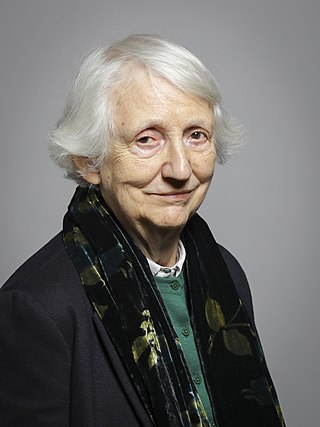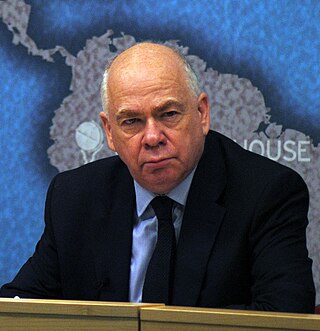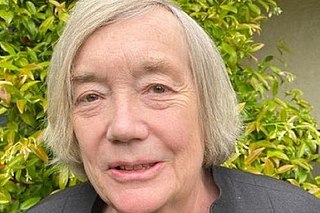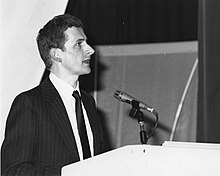
All Souls College is a constituent college of the University of Oxford in England. Unique to All Souls, all of its members automatically become fellows. It has no undergraduate members, but each year, recent graduate and postgraduate students at Oxford are eligible to apply for a small number of examination fellowships through a competitive examination and, for those shortlisted after the examinations, an interview.

Onora Sylvia O'Neill, Baroness O'Neill of Bengarve, is a British philosopher and a crossbench member of the House of Lords.
Sir Kenneth Charles Calman, HonFAcadMEd is a Scottish doctor and academic who formerly worked as a surgeon, oncologist and cancer researcher and held the position of Chief Medical Officer of Scotland, and then England. He was Warden and Vice-Chancellor of Durham University from 1998 to 2006 before becoming Chancellor of the University of Glasgow. He held the position of Chair of the National Cancer Research Institute from 2008 until 2011. From 2008 to 2009, he was convener of the Calman Commission on Scottish devolution.
Eve Cordelia Johnstone CBE FRCP FRCPE FRCPGla FRCPsych FMedSci FRSE is a Scottish physician, clinical researcher, psychiatrist and academic. Her main research area is in the field of schizophrenia and psychotic illness. She is Emeritus Professor of Psychiatry and Honorary Assistant Principal for Mental Health Research Development and Public Understanding of Medicine at the University of Edinburgh. She is best known for her 1976 groundbreaking study that showed brain abnormalities in schizophrenic patients compared to a control group.

Jonathan Wolff is a British philosopher and academic. He was Professor of Philosophy and Dean of the Faculty of Arts and Humanities at University College London (UCL) in 2012–16.

Patrick John Dunleavy, is Emeritus Professor of Political Science and Public Policy within the Government Department of the London School of Economics (LSE). He was also Co-Director of Democratic Audit and Chair of the LSE Public Policy Group. In addition Dunleavy is an ANZSOG Institute for Governance Centenary Chair at the University of Canberra, Australia.
Sir David Glyndwr Tudor Williams, was a Welsh barrister and legal scholar. He was president of Wolfson College, Cambridge from 1980 to 1992. He was also vice-chancellor of the University of Cambridge: on a part-time basis from 1989 to 1992, and then as the first full-time vice-chancellor from 1992 to 1996.

Sir Lawrence David Freedman, is a British academic, historian and author specialising in foreign policy, international relations and strategy. He has been described as the "dean of British strategic studies" and was a member of the Iraq Inquiry. He is an Emeritus Professor of War Studies at King's College London.

Bo Abraham Mendel Rothstein is a Swedish political scientist. He is a former Professor of Government and Public Policy at University of Oxford's Blavatnik School of Government.
Mona Siddiqui is a British academic. She is Professor of Islamic and Interreligious Studies at the University of Edinburgh, a member of the Commission on Scottish Devolution and a member of the Nuffield Council on Bioethics. She is also a regular contributor to Thought for the Day, Sunday and The Moral Maze on BBC Radio 4, and to The Times, The Scotsman, The Guardian, Sunday Herald.
The Nuffield Council on Bioethics is a UK-based independent charitable body, which examines and reports on bioethical issues raised by new advances in biological and medical research. Established in 1991, the Council is funded by the Nuffield Foundation, the Medical Research Council and the Wellcome Trust. The Council has been described by the media as a 'leading ethics watchdog', which 'never shrinks from the unthinkable'.

The Blavatnik School of Government is a school of public policy founded in 2010 at the University of Oxford in England. The School was founded following a £75 million donation from a business magnate Len Blavatnik, supported by £26 million from the University of Oxford. It is part of Oxford's Social Sciences Division, which aims to train current and future leaders in the practice of government.
The various academic faculties, departments, and institutes of the University of Oxford are organised into four divisions, each with its own Head and elected board. They are the Humanities Division; the Social Sciences Division; the Mathematical, Physical and Life Sciences Division; and the Medical Sciences Division.
Gareth John Darwin is a British historian and academic, who specialises in the history of the British Empire. From 1984 to 2019, he was the Beit Lecturer in Commonwealth History at the University of Oxford and a Fellow of Nuffield College, Oxford. He was a lecturer in history at the University of Reading between 1972 and 1984.

A Government That Worked Better and Cost Less? Evaluating Three Decades of Reform and Change in UK Central Government is a book written by Christopher Hood and Ruth Dixon, and published by Oxford University Press in 2015. The authors attempt to assess the success of three decades of New Public Management, which was intended to create "a government that works better and costs less", concluding that "The short answer seems to be: higher costs and more complaints". The book was described by Michael Moran as "brilliant, highly original", and he concluded that "Future researchers will see further precisely because they will be able to stand on the shoulders of these scholars". In November 2015 the book was awarded the Louis Brownlow Book Award of the National Academy of Public Administration "for its comprehensive study of reform, cost and performance". In November 2016 it was awarded the W. J. M. Mackenzie award of the Political Studies Association, the jury stating that the book "carries considerable implications for policy-making, as well as the field of academic enquiry which it addresses." The book was repeatedly cited in Michael Barber's report Delivering better outcomes for citizens: practical steps for unlocking public value.

Helen Zerlina Margetts, is Professor of Internet and Society at the Oxford Internet Institute (OII), University of Oxford and from 2011 to 2018 was Director of the OII. She is currently Director of the Public Policy Programme at The Alan Turing Institute. She is a political scientist specialising in digital era governance and politics, and has published over a hundred books, journal articles and research reports in this field.
Ian Malcolm David Little, was a British economist.
Pepper Dagenhart Culpepper is an American political scientist.
Jennifer Dixon, CBE, MBChB, FRCP, FFPH, is the chief executive of the Health Foundation, a large independent charity in the United Kingdom. Her work has been recognised by several national and international bodies for her significant impact in driving national health policy making.

Gillian Peele is a British academic in the field of British, American and comparative politics. She is an emeritus fellow of Lady Margaret Hall, University of Oxford, having retired from teaching in 2016, and in August 2021 began serving a five year term as an independent member on the Committee on Standards in Public Life (CSPL) of the United Kingdom.










